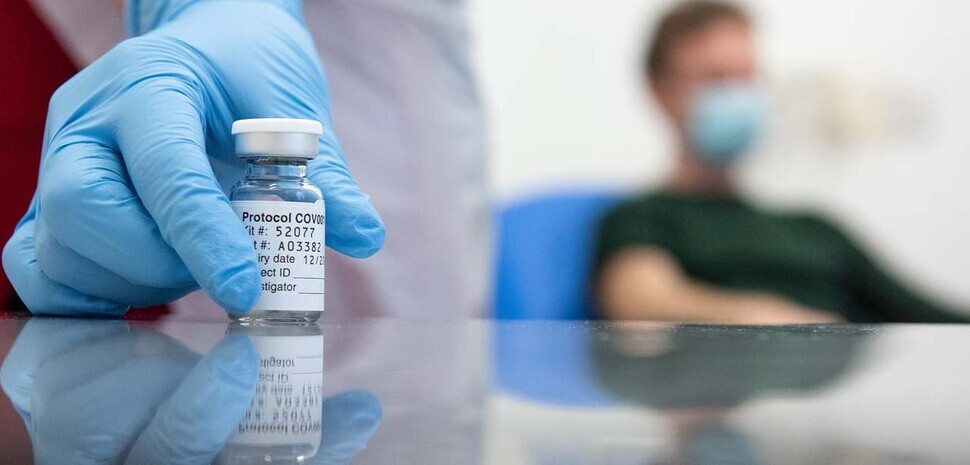hankyoreh
Links to other country sites 다른 나라 사이트 링크
S. Korea says it has secured enough COVID-19 vaccines for 44 million people

The South Korean government announced on Dec. 8 that it has secured supplies of COVID-19 vaccines developed by international pharmaceutical companies AstraZeneca, Pfizer, Janssen and Moderna. The plan is to obtain enough vaccines for 44 million people, including preorders obtained directly from pharmaceutical companies.
A cabinet meeting presided over by Prime Minister Chung Sye-kyun on Dec. 8 deliberated on and approved the plan to obtain COVID vaccines developed overseas. The meeting also discussed plans for administering the vaccines. On this day, the government finalized its plan to obtain approximately 10 million vaccines through the COVAX Facility and secure supplies of another 34 million through global vaccine companies. The COVAX facility is an international coalition driven by the World Health Organization (WHO), the Coalition for Epidemic Preparedness Innovations (CEPI) and Gavi, The Vaccine Alliance (GAVI), with the goal of achieving a fair distribution of vaccines to 20% of the world’s population by the end of 2021.
The Korean government formed a “special diagnosis team on vaccine adoption” comprising experts from the private sector in late June, and began negotiating with companies leading the development of vaccines, including Pfizer and AstraZeneca, in July. The original plan was to obtain sufficient vaccines for 60% of the population, but this was increased to enough for 44 million people because of experts pointing out the possibility of recently developed vaccines failing. In line with this, the government has secured early access to a total of 64 million doses through international pharmaceutical companies: 20 million from AstraZeneca, 20 million from Pfizer, 4 million from Janssen and 20 million from Moderna. The AstraZeneca, Pfizer and Moderna vaccines each require two shots per person. The 34 million preorders combined with the 10 million obtained through the COVAX Facility should be sufficient to meet the target volume.
Contract negotiations with each pharmaceutical company are currently in different stages. According to the government, the early access contract with AstraZeneca has already been concluded, while binding purchase agreements have been signed with the other firms to confirm the purchased quantities. “The early access vaccines will be introduced in stages from February to March next year,” the government said in a statement. “We will continue to keep abreast of the latest updates in vaccine development and take active steps to secure the additional volume required.”
The government also plans to set up a dedicated organization for vaccine adoption and immunization at the Korea Disease Control and Prevention Agency (KDCA), tentatively named the “COVID-19 Immunization Response Implementation Team.” This decision stems from the multitude of preparations that must be made to guarantee vaccine safety because vaccines developed to date have strict storage requirements, a short expiration date and require two shots per person. The Pfizer vaccines even have to be stored at a temperature of 70 degrees below zero.
“As the development of the vaccines is not yet complete and there are still concerns over issues such as efficacy, we will remain flexible when it comes to making decisions on the vaccination period by considering factors such as the domestic COVID19 situation, vaccination trends overseas, the presence of side effects and public demand,” the government stated. However, the first groups recommended to get the vaccine will be those who are most vulnerable to the virus such as the elderly, group facility residents and those with chronic diseases, as well as an estimated 3.6 million people who perform essential social services, such as healthcare workers.
By Choi Ha-yan, staff reporter
Please direct comments or questions to [english@hani.co.kr]

Editorial・opinion
![[Guest essay] Preventing Korean Peninsula from becoming front line of new cold war [Guest essay] Preventing Korean Peninsula from becoming front line of new cold war](https://flexible.img.hani.co.kr/flexible/normal/500/300/imgdb/original/2024/0507/7217150679227807.jpg) [Guest essay] Preventing Korean Peninsula from becoming front line of new cold war
[Guest essay] Preventing Korean Peninsula from becoming front line of new cold war![[Column] The state is back — but is it in business? [Column] The state is back — but is it in business?](https://flexible.img.hani.co.kr/flexible/normal/500/300/imgdb/original/2024/0506/8217149564092725.jpg) [Column] The state is back — but is it in business?
[Column] The state is back — but is it in business?- [Column] Life on our Trisolaris
- [Editorial] Penalties for airing allegations against Korea’s first lady endanger free press
- [Editorial] Yoon must halt procurement of SM-3 interceptor missiles
- [Guest essay] Maybe Korea’s rapid population decline is an opportunity, not a crisis
- [Column] Can Yoon steer diplomacy with Russia, China back on track?
- [Column] Season 2 of special prosecutor probe may be coming to Korea soon
- [Column] Park Geun-hye déjà vu in Yoon Suk-yeol
- [Editorial] New weight of N. Korea’s nuclear threats makes dialogue all the more urgent
Most viewed articles
- 1Yoon’s broken-compass diplomacy is steering Korea into serving US, Japanese interests
- 2[Guest essay] Preventing Korean Peninsula from becoming front line of new cold war
- 3[Column] Why Korea’s hard right is fated to lose
- 460% of young Koreans see no need to have kids after marriage
- 5S. Korean first lady likely to face questioning by prosecutors over Dior handbag scandal
- 6[Guest essay] Maybe Korea’s rapid population decline is an opportunity, not a crisis
- 7[Column] The state is back — but is it in business?
- 8After 2 years in office, Yoon’s promises of fairness, common sense ring hollow
- 9[Reporter’s notebook] In Min’s world, she’s the artist — and NewJeans is her art
- 10[Editorial] Penalties for airing allegations against Korea’s first lady endanger free press